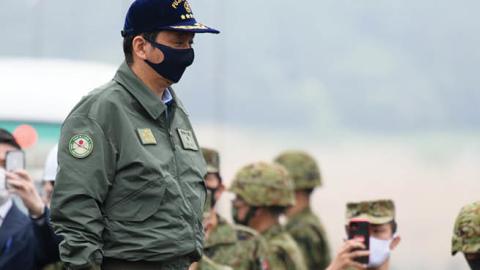China’s belligerence has its neighbors on edge. Abrasive comments by China’s diplomatic core along with its increasing military activities in the Taiwan Strait and East China Sea have got capitals like Tokyo worried that Beijing may attempt the unthinkable – a military invasion of Taiwan. With Taiwan less than 100 miles away from Japan’s southeastern-most territory, Japan’s defense minister and other high ranking officials are sounding the alarm about the “ survival of Taiwan ”—leading to the most significant shift in Japan’s Taiwan policy in decades.
When Prime Minister Yoshihide Suga met with President Joseph Biden back in April, it was the first time in over 50 years that a statement from Japanese and American leaders highlighted the importance of maintaining peace and stability in the Taiwan Strait. Beijing’s response to the statement was, unsurprisingly, to tell Tokyo and Washington to mind their own business—but Japan has continued to press the issue in increasingly bold terms, first as part of a joint Japan-European Union summit in May, then as part of the Group of Seven summit communique in June, and most recently in the discussion between Japanese Defense Minister Nobuo Kishi and American Deputy Secretary of State Wendy Sherman.
Over the years, Tokyo has maintained a complicated relationship between Beijing and Taipei. Much of this has to do with economic interests. China is Japan’s largest trading partner, while Taiwan is Japan’s fifth largest trading partner at nearly a quarter of the amount Japan trades with China. China has historically been the fourth most popular destination for Japanese direct investment. Even though Japanese companies in China are less and less sure about the business environment in China, China is still a profitable place for foreign companies—at least for now.
As a result, Japanese officials have a history of trying not to rock the boat when it comes to engaging with Beijing. Few officials want to stick there neck out and cause a diplomatic uproar like the one that led to boycotts against Japanese automobile companies in China back in 2012. Even today, some officials like Toshihiro Nikai, former trade minister and Secretary-General of the Liberal Democratic Party, are seen as being much more passive when it comes to China.
Yet the situation is changing rapidly. An important catalyst to Japan’s new Taiwan policy has been the security and partnership provided by the U.S. and Europe through the Free and Open Indo-Pacific framework. As a recent annual report from Japan’s Ministry of Defense highlights, Taiwan’s security is not only important for the security of Japan but for the world. The deterioration of China’s relationships with Japan’s fellow Quadrilateral Strategic Dialogue partners may also have hastened this change in policy, giving Tokyo cover to act in a manner that would normally anger Beijing.
Speaking at a recent event at Hudson Institute, Japanese State Minister of Defense Yasuhide Nakayama argued that Taiwan must be protected as a fellow democracy, and added that Japan and Taiwan aren’t only friends, they’re family. Just a few weeks later, Japan’s Deputy Prime Minister Taro Aso echoed this sentiment. As noted by former Japanese Prime Minister Shinzo Abe, such comments aren’t meant to provoke conflict, but they are certainly meant to send Beijing a clear message that it’s military expansionism won’t be tolerated. He warned, at the first-ever summit between Japanese, American, and Taiwanese lawmakers last month, the last thing we should want is for Taiwan to loose many of its freedoms like we’re seeing in Hong Kong under Beijing’s new national security laws.
Far from being outliers, these views are becoming the norm for Japan’s political elite. In early June, a project team for the Liberal Democratic Party issued its own review of Japan’s Taiwan policy that contained a list of recommendations including encouraging increased dialogue with Taiwanese officials and organizations, bolstering Japan’s deterrence capabilities, strengthening supply chains with Taiwan and Taiwanese companies, and even inviting Taiwan to join the mega-trade agreement formally known as the Trans-Pacific Partnership. And at the end of August, members of the LDP and Taiwan’s Democratic Progressive Party held their first-ever security meeting.
Popular opinion in Japan is also shifting. Following the Suga-Biden summit, one poll found that 74% of Japanese citizens support their country’s new efforts towards maintaining stability in the Taiwan Strait. Juxtapose this with another recent poll that found at least 71% of Japanese have an unfavorable view of China and it becomes more obvious why more Japanese officials are now willing to push the line with Beijing.
This goes to show Japan’s new policy towards Taiwan has more to do with Japan’s own interests and is not just a feature of America’s foreign policy. Some may worry though that the Biden administration’s failures in Afghanistan, and what it could mean for U.S. security commitments to Taiwan, could leave Japan in a difficult position. That recent events could shift a rethink of Japan’s new Taiwan policy. While Taiwan is not Afghanistan, this may be true if the Biden administration and Congress fail to get more proactive about showing its support for Taiwan and the region.
Japan will continue to invest in ways that support Taiwan while deterring China’s militaristic ambitions. But these efforts could slow if Taiwan doesn’t receive reciprocal support from the broader international community as well. For Japan, it is crucial that its fellow Quad members and fellow democratic partners not only support Japan’s efforts but also stand up for Taiwan in whatever way they can. At the moment, Japanese officials are only toying with the idea of signing a trade agreement with Taiwan; but if the U.S. were to pursue its own trade agreement with Taiwan, a Japan-Taiwan trade agreement would almost certainly follow suit.
Beijing’s escalating use of intimidation and coercion have put the U.S. and Japan on the alert for Taiwan’s security. A strong Japan-Taiwan relationship, once mostly developed through back-channels, is now being brought to the surface. But the U.S. shouldn’t take Japan’s bold new Taiwan policy for granted. It could quickly lose steam if Japan were to enter another era of annual leadership changes. That’s why it’s important for the U.S. and other like-minded partners to take this opportunity to engage more with Taiwan. Japan shouldn’t be the only country with a bold new Taiwan policy.















